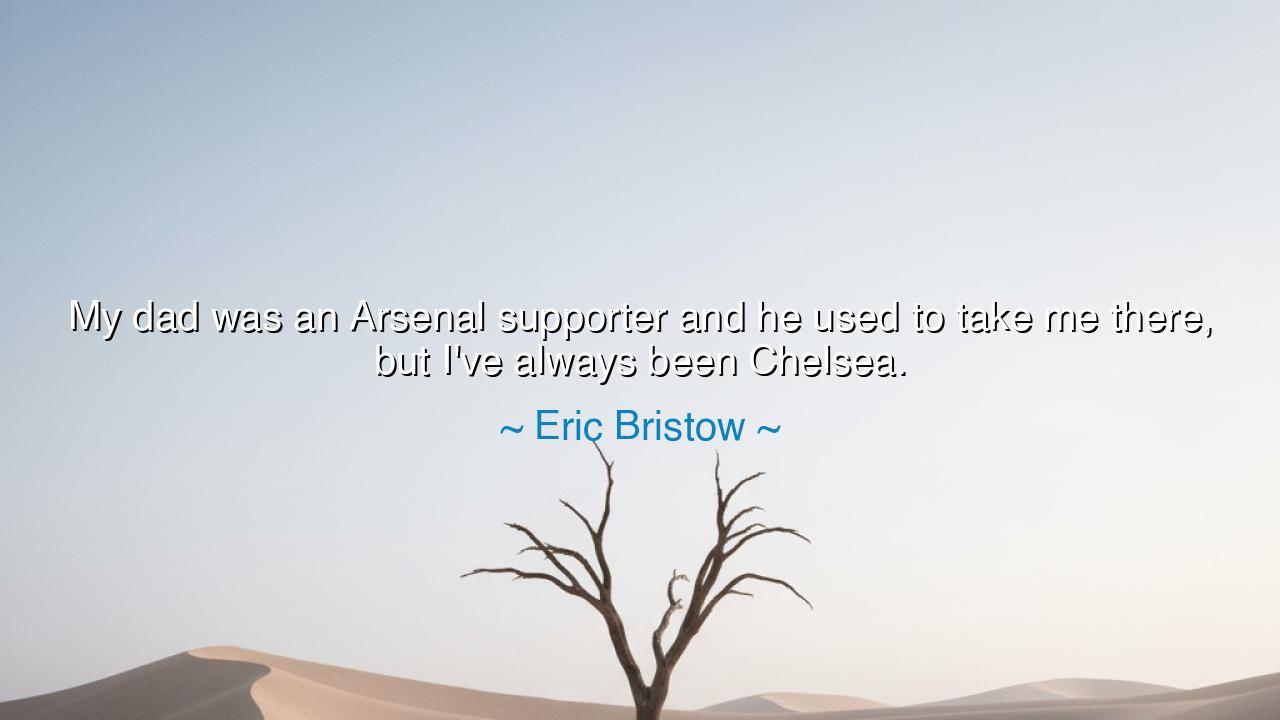
My dad was an Arsenal supporter and he used to take me there, but
My dad was an Arsenal supporter and he used to take me there, but I've always been Chelsea.






The words “My dad was an Arsenal supporter and he used to take me there, but I’ve always been Chelsea,” spoken by Eric Bristow, are more than a confession of football loyalty — they are a reflection on identity, individuality, and the delicate rebellion of love. Beneath the surface of sport lies a timeless story: the child who honors the path of the parent, yet dares to walk his own. It is a story as old as humanity itself — the tension between heritage and self-discovery, between belonging and becoming. Bristow’s words may seem casual, but within them beats the eternal rhythm of the generations — the father’s influence and the son’s awakening.
In the days of the ancients, the act of stepping away from one’s father’s path was not an act of betrayal but of becoming. Every lineage has within it this sacred moment: when the son, standing in the light of the father’s love, sees another horizon and must follow it. The father takes the son to his temple — in this case, the roaring grounds of Arsenal, a cathedral of loyalty and tradition. Yet within the child’s heart, another fire is lit — Chelsea, a symbol of his own calling, his own voice amidst the crowd. This simple difference, this divergence of allegiance, is not a rift but a rite of passage. It is through such small acts of defiance that the human soul learns to stand on its own.
Bristow’s words remind us that the bond between father and son is not weakened by difference — it is tested, refined, and ultimately strengthened by understanding. To follow one’s heart, even when it beats against tradition, is an act of both courage and honesty. The father’s team represents legacy; the son’s choice represents destiny. In the ancient tales, this is the moment when the apprentice departs the master’s workshop, when the wanderer leaves home to find his own truth. And yet, the love remains — for without the father’s influence, the son would never have found the road to begin with. Thus, in every act of independence lies an unseen tribute: we rebel not to reject love, but to fulfill it by becoming fully ourselves.
Consider the legend of King Telemachus, son of Odysseus, who longed to know his father but grew restless under the shadow of his absence. Guided by Athena, he set out from Ithaca to find his own path, to discover the truth of his lineage and his place within it. Though his journey was born of separation, it led him to understanding — that a son’s greatness does not depend on imitation, but on integration. So too does Bristow’s reflection capture that balance: his father’s love brought him into the world of football, yet his own heart chose its color and crest. In this, he honors both his father and himself — for it is not in obedience but in authenticity that love reaches its fullest expression.
Loyalty, the ancients taught, is not blind adherence but faithful integrity. To be “Chelsea” while one’s father is “Arsenal” is to embody loyalty of a deeper kind — loyalty to one’s own truth. The world often mistakes conformity for devotion, yet the soul knows that the highest devotion is to live sincerely. The father may teach the son the joy of the game, the roar of the crowd, the spirit of belonging — but the son must decide where his heart feels at home. In this way, every generation renews the meaning of legacy. The father builds the bridge; the son chooses the direction to cross.
We see this pattern across history. The philosopher Socrates inspired Plato, yet Plato did not mirror his master — he transformed the lessons, creating his own realm of thought. Plato’s student Aristotle would do the same, breaking from his teacher to define his own philosophy of reason. This is the rhythm of human greatness: each generation learning from the last, yet daring to differ. Eric Bristow’s words, humble though they may appear, echo this same inheritance — that respect and rebellion are not opposites, but twin forces that ensure the evolution of wisdom and love.
And so, my children, hear this truth and carry it with reverence: you are born from others, but not bound by them. To honor your parents is to live with integrity — not as their reflection, but as their continuation. Walk your own path, even if it diverges from the road they built, for in doing so you fulfill their deepest hope: that you will live fully, truly, and freely. Remember the lesson of Bristow’s simple confession — that even when father and son wear different colors, their hearts still beat in the same rhythm of devotion. For in the end, the goal of every generation is not to raise replicas, but to raise souls brave enough to become their own legends.






AAdministratorAdministrator
Welcome, honored guests. Please leave a comment, we will respond soon